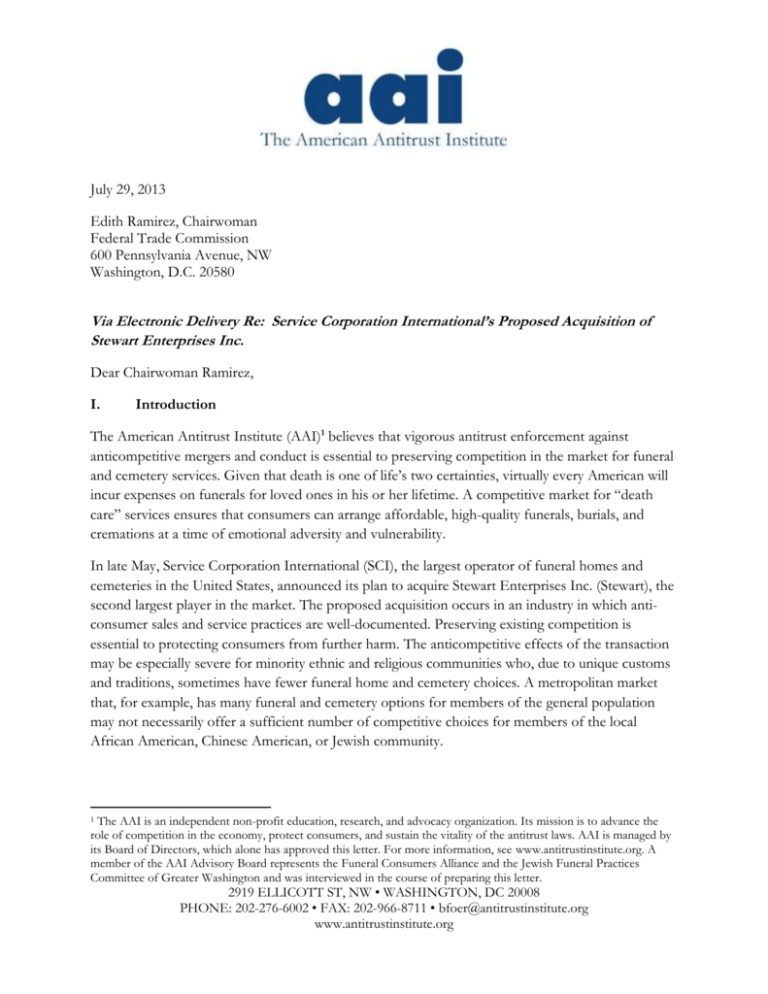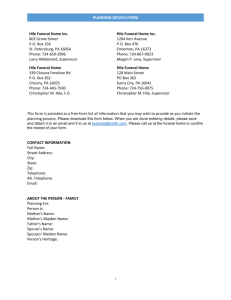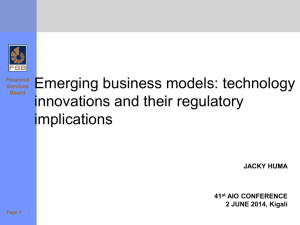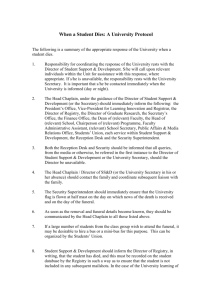American Antitrust Institute
advertisement

July 29, 2013 Edith Ramirez, Chairwoman Federal Trade Commission 600 Pennsylvania Avenue, NW Washington, D.C. 20580 Via Electronic Delivery Re: Service Corporation International’s Proposed Acquisition of Stewart Enterprises Inc. Dear Chairwoman Ramirez, I. Introduction The American Antitrust Institute (AAI)1 believes that vigorous antitrust enforcement against anticompetitive mergers and conduct is essential to preserving competition in the market for funeral and cemetery services. Given that death is one of life’s two certainties, virtually every American will incur expenses on funerals for loved ones in his or her lifetime. A competitive market for “death care” services ensures that consumers can arrange affordable, high-quality funerals, burials, and cremations at a time of emotional adversity and vulnerability. In late May, Service Corporation International (SCI), the largest operator of funeral homes and cemeteries in the United States, announced its plan to acquire Stewart Enterprises Inc. (Stewart), the second largest player in the market. The proposed acquisition occurs in an industry in which anticonsumer sales and service practices are well-documented. Preserving existing competition is essential to protecting consumers from further harm. The anticompetitive effects of the transaction may be especially severe for minority ethnic and religious communities who, due to unique customs and traditions, sometimes have fewer funeral home and cemetery choices. A metropolitan market that, for example, has many funeral and cemetery options for members of the general population may not necessarily offer a sufficient number of competitive choices for members of the local African American, Chinese American, or Jewish community. The AAI is an independent non-profit education, research, and advocacy organization. Its mission is to advance the role of competition in the economy, protect consumers, and sustain the vitality of the antitrust laws. AAI is managed by its Board of Directors, which alone has approved this letter. For more information, see www.antitrustinstitute.org. A member of the AAI Advisory Board represents the Funeral Consumers Alliance and the Jewish Funeral Practices Committee of Greater Washington and was interviewed in the course of preparing this letter. 1 2919 ELLICOTT ST, NW • WASHINGTON, DC 20008 PHONE: 202-276-6002 • FAX: 202-966-8711 • bfoer@antitrustinstitute.org www.antitrustinstitute.org If the FTC finds through its investigation that the effect of this transaction “may be substantially to lessen competition”2 and harm consumers, it should act. And, if the investigation reveals likely anticompetitive harm in many markets, the FTC should not accept a consent order with conduct and/or structural remedies. Crafting and enforcing appropriate remedies in dozens of markets would raise serious administrative challenges. Furthermore, even structural remedies have a nontrivial rate of failure. If the FTC finds that the transaction is likely to harm consumers in many markets, it should seek to enjoin the acquisition rather than expend limited governmental resources on trying to fix the merger so that it can be consummated subject to many conditions. II. SCI’s Proposed Acquisition of Stewart Is Part of a Larger Trend Toward Consolidation In late May, SCI announced that it would acquire Stewart for $1.4 billion.3 SCI is the largest operator of funeral and cemetery facilities in the United States. In its most recent fiscal year, SCI had revenue of $2.4 billion and operated 1,437 funeral homes and 374 cemeteries, including 213 combined funeral home and cemetery locations. Stewart, the second largest entity in the industry nationwide, had revenue of $526 million and operated 216 funeral homes and 141 cemeteries in 24 states in its fiscal year ending on January 31, 2013. The parties predict that the deal will yield $60 million in annual cost savings within 24 months of closing. This is SCI’s second public attempt to acquire Stewart. Its offer in 2008 was rejected by Stewart’s board of directors as inadequate.4 This transaction is the latest merger in a wave of consolidation over the past fifteen years, a trend initiated largely by SCI. Several of these combinations have invited FTC enforcement action and resulted in consent orders.5 In 2008, SCI purchased Keystone North America, which was then the fifth largest operator of funeral homes and cemeteries. In 2005, SCI acquired the then-second largest funeral and cemetery service provider, Alderwoods. And, SCI in 1999 acquired Equity Corporation International, which was at the time the fourth largest operator of funeral homes and cemeteries in the country. In addition to these three large acquisitions, SCI has acquired several local funeral home and cemetery operators. Most SCI facilities feature the Dignity Memorial brand and also carry the name of the family or individual that previously owned them.6 15 U.S.C. § 18. Service Corporation International, Investor Presentation Regarding SCI’s Acquisition of Stewart Enterprises, Inc. (May 29, 2013). 4 Stewart Enterprises Rejects Proposal from Service Corporation International, BLOOMBERG, July 14, 2008, available at http://www.bloomberg.com/apps/news?pid=newsarchive&sid=azvodLJ0aSe0. 5 Service Corporation International and Keystone North America Inc., FTC File No. 1010013 (March 25, 2010, Decision and Order); Service Corporation International, FTC Docket No. C-4275 (Nov. 24, 2009, Decision and Order); Service Corporation International and Alderwoods Group, Inc., FTC Docket No. C-4174 (Nov. 22, 2006, Decision and Order); Service Corporation International, FTC Docket No. C-3959 (May 18, 2000, Decision and Order); Service Corporation International, FTC Docket No. C-3869 (May 4, 1999, Decision and Order). 6 Service Corporation International, History, available at http://www.sci-corp.com/SCICORP/History.aspx?alias=0103. 2 3 2 III. Protecting Consumers Requires Preserving Competition Funerals and burials are one of the largest expenses a person incurs in his or her lifetime. In 2009, the National Funeral Directors Associated estimated that the average adult funeral cost $6,560, and the FTC found that funerals frequently cost in excess of $10,000.7 Given the amount of money spent on funerals and related services, even a modest percentage increase in price can inflict serious economic hardship on the loved ones of a deceased person. As a result of cultural norms that make death rites obligatory, low-income families may be most affected by higher prices for funerals and burials.8 To compound the expenses involved, consumers must make decisions “under the strain of bereavement . . . and [frequently] lack familiarity with the funeral transaction.”9 And, as the U.S. population ages,10 a larger fraction of families will have to plan funerals in a given year. Poor service, often involving SCI-owned funeral homes and cemeteries, has been a persistent complaint from consumers. The Funeral Consumers Alliance, a federation of local organizations dedicated to protecting purchasers of funeral and cemetery services from abusive conduct, has recorded this problematic history.11 SCI has generated numerous consumer complaints nationwide alleging abusive and deceptive sales methods and unexpected charges and fees.12 In addition, negligent and intentional mishandling of bodies has been well documented at SCI cemeteries. These practices include selling the same burial plot to multiple individuals or families, not burying loved ones in the selected plot, and even exhuming and discarding bodies to make room for new burials in oversold cemeteries.13 With the long history of abusive practices in the industry,14 the FTC in 1984 took the exceptional step of issuing a consumer protection rule specifically for funeral homes. The FTC’s Funeral Rule imposes an affirmative duty on funeral homes to provide transparent itemized pricing for funeral goods and services and to inform consumers that they are free to choose what individual items to purchase.15 While it has helped create a thriving market for funeral goods like caskets and delivered UNITED STATES GOVERNMENT ACCOUNTABILITY OFFICE, DEATH SERVICES: STATE REGULATION OF THE DEATH CARE INDUSTRY CARIES AND OFFICIALS HAVE MIXED VIEWS ON NEED FOR FURTHER FEDERAL INVOLVEMENT 7 (Dec. 2011) (hereafter “GAO Report”). 8 Dwayne A. Banks, The Economics of Death? A Descriptive Study of the Impact of Funeral and Cremation Costs, 22 DEATH STUD. 269, 282-83 (1998). 9 FTC Funeral Rule, 16 C.F.R. pt. 453 (1999); See also Steven W. Kopp & Elyria Kemp, The Death Care Industry: A Review of Regulatory and Consumer Issues, 51 J. CONSUMER AFF. 156, 165 (2007). 10 Top Two U.S. Funeral Companies Merge as Baby Boomers Boost Demand, REUTERS, May 29, 2013, available at http://www.reuters.com/article/2013/05/29/us-stewartenterprises-servicecorporation-idUSBRE94S0HP20130529. 11 Funeral Consumers Alliance, About the FCA, available at http://www.funerals.org/about-the-fca. 12 JOSHUA SLOCUM & LISA CARLSON, FINAL RIGHTS: RECLAIMING THE AMERICAN WAY OF DEATH 44-46 (2011). 13 Testimony on Behalf of Funeral Consumers Alliance, Inc. Before the Subcomm. On Consumer Protection of the H. Comm. On Energy and Commerce, 111th Cong.6-8 (2009) (statement of Joshua Slocum, Executive Director, Funeral Consumers Alliance, Inc.) (hereafter “Slocum testimony”). 14 JESSICA MITFORD, THE AMERICAN WAY OF DEATH (1963). 15 FTC Funeral Rule, 16 C.F.R. pt. 453 (1999). 7 3 real benefits for consumers,16 the Funeral Rule continues to be flouted with disturbing regularity.17 And, importantly, the Funeral Rule does not cover cemeteries.18 As the FTC and Department of Justice (DOJ) recognized in the 2010 Horizontal Merger Guidelines, mergers can have myriad anticompetitive effects. Mergers can result in higher prices and lead to wealth transfers from consumers to businesses with market power and create deadweight losses.19 They can also lead to degradation in service and other non-price terms.20 SCI and Stewart own funeral homes and cemeteries in many of the same metropolitan areas. The two entities both own funeral homes and/or cemeteries in at least twenty-four cities, including Dallas, Houston, Los Angeles, and Washington, D.C. As the FTC has recognized in earlier enforcement actions in the industry, national chains like SCI and Stewart likely exert a greater competitive constraint on each other than smaller independent players.21 Competition plays a vital role in providing consumers with affordable prices and high-quality funeral and burial services. As discussed below, competition between SCI and Stewart mortuaries provides affordable funerals for Jewish families in the Washington, D.C. metropolitan area. In addition to higher prices, the merger could lead to diminished service.22 As a district court has recognized in a merger case, a lack of competition may be reflected, not necessarily in higher prices, but in supplier unresponsiveness to consumer desires.23 Unless there is “competition to spur it to make changes,”24 the combined SCI-Stewart entity may engage in abusive sales practices and provide poor service at little cost to its bottom-line. Preserving competition is critical to ensure that consumers do not face an increase in price and further reduction in quality of service for funeral and cemetery services. Kopp & Kemp, supra note 9, at 159. Press Release, Fed. Trade Comm’n, FTC Conducts Undercover Inspections of Funeral Homes in Eight States to Press Funeral Homes to Comply with Consumer Protection Law (July 24, 2013), available at http://www.ftc.gov/opa/2013/07/funeralrule.shtm; GAO Report, supra note 7, at 10. 18 Slocum Testimony, supra note 12, at 2. 19 U.S. DEP’T OF JUSTICE & FED. TRADE COMM’N, HORIZONTAL MERGER GUIDELINES§ 1 (Aug. 19, 2010) (hereafter “HORIZONTAL MERGER GUIDELINES”). 20 Id. 21 Service Corporation International and Keystone North America Inc., FTC File No. 1010013 (March 25, 2010, Analysis of Agreement Containing Consent Orders to Aid Public Comment); Service Corporation International and Alderwoods Group, Inc., FTC Docket No. C-4174 (Nov. 22, 2006, Analysis of Agreement Containing Consent Orders to Aid Public Comment). 22 See, e.g., Daniel Greenfield, Competition and Service Quality: New Evidence from the Airline Industry 21-23 (2012); David A. Matsa, Competition and Product Quality in the Supermarket Industry, 126 Q. J. ECON. 1539, 1582-83 (2011); Neil W. Averitt & Robert H. Lande, Using the “Consumer Choice” Approach to Antitrust Law, 74 ANTITRUST L.J. 175, 234 (2007); Michael J. Mazzeo, Competition and Service Quality in the U.S. Airline Industry, 22 REV. INDUS. ORG. 275, 294-95 (2003); Simon Domberger & Avrom Sherr, The Impact of Competition on Pricing and Quality of Legal Services, 9 INT’L REV. L. & ECON. 51, 53-55 (1989). 23 United States v. Franklin Electric Co., 130 F. Supp. 2d 1025, 1034-35 (W.D. Wis. 2000). 24 Id. at 1035. 16 17 4 IV. Minority Ethnic and Religious Groups May Have Fewer Options for Funerals and Burials than the General Population Funeral customs and traditions vary widely across ethnic and religious communities. For example, a funeral home that caters to the general population may not be able or willing to perform traditional Jewish rituals, particularly if such rituals justify lower prices by taking on certain of the burdens normally undertaken by the funeral home. In other words, a town, city, county, or metropolitan area market may encompass multiple broad and narrow product markets segmented by ethnicity and religion. In its consent order in SCI-Alderwoods, the FTC recognized the existence of ethnic and religious submarkets for funeral and burial services. It stated that “[b]ecause of the preferences of ‘customsconscious’ customers in some local markets, the alleged product market is limited to facilities that provide the customs and rituals for a specific population.”25 The consent order identified three communities that were likely to be affected adversely by SCI’s acquisition of Alderwoods: African Americans, Chinese Americans, and Jewish Americans.26 An empirical study co-authored by the former chief economist at the DOJ Antitrust Division supports the FTC’s decision to define submarkets on the basis of ethnicity and religion in the SCI-Alderwoods case.27 SCI’s proposed acquisition of Stewart raises competitive concerns in at least one ethnic submarket. In the Washington, D.C. metropolitan area, Stewart owns the Hines-Rinaldi Funeral Home (HinesRinaldi), the only low-cost funeral home that performs certain traditional Jewish rituals. SCI owns the other three funeral homes that together with Hines-Rinaldi conduct an overwhelming share of Jewish funerals in the metro area.28 An independent funeral home performs Jewish services but does not have the facilities for ritual washing and watching.29 According to the Jewish Funeral Practices Committee of Greater Washington (JFPCGW), its two-year contract with Hines-Rinaldi provides traditional Jewish funerals at a price that is sixty percent less than the next lowest-price funeral home. Hines-Rinaldi offers members of JFPCGW-affiliated synagogues a full-funeral-and-burial, excluding cemetery charges, for $1,820; Edward Sagel Funeral Direction, a Jewish funeral home owned by SCI, provides a comparable package for nearly $5,000.30 Hines-Rinaldi is also the only funeral home that does not bill families until 30 days after the burial, in observance of the traditional Jewish prohibition on conducting business activity during the mourning period.31 This evidence suggests that Hines-Rinaldi functions as a maverick – “a firm that plays a disruptive role in the Service Corporation International and Alderwoods Group, Inc., FTC Docket No. C-4174 (Nov. 22, 2006, Analysis of Agreement Containing Consent Orders to Aid Public Comment). 26 Id. 27 See Judith Chevalier, David E. Harrington & Fiona Scott Morton, Differentiated to Death? 23 (2010) (“Our preliminary results suggest low substitutability between funeral homes with different ethnic identities.”). 28 Jewish Funeral Practices Committee of Greater Washington, Inc., Request for Letters from Maryland Congregations and Jewish Organizations to the Federal Trade Commission (FTC) and the Maryland Attorney General Opposing SCI Acquisition of Hines-Rinaldi Funeral Home (June 13, 2013). 29 Id. 30 Id. 31 Id. 25 5 market to the benefit of consumers”32 – in the market for Jewish funerals in the Washington, D.C. area. Given Stewart’s competitive vigor, the acquisition threatens to eliminate an aggressive market participant and impose a significant price increase on Jewish families in Washington D.C. We do not have specific evidence as to whether the D.C. situation described above is typical of many communities. Whether there are minority communities with similar concerns and if so, whether these concerns are justified, is something that an FTC investigation must determine. We also do not know whether SCI plans to change Hines-Rinaldi’s practices once it has been acquired, although we think its stated intentions should be irrelevant to the enforcement analysis. SCI’s proposed acquisition of Stewart affects a market in which purchases are made under emotional distress and in which abusive practices toward consumers have been widespread. This acquisition would combine the two leading providers of funerals-and-burials nationally and could compound these anti-consumer realities. The transaction’s anticompetitive effects may be felt most acutely among ethnic and religious groups that have fewer funeral-and-burial options than the general population. If the FTC through its investigation determines that the transaction is likely to result in anticompetitive effects in many markets, it should not accept a consent order. Formulation and enforcement of satisfactory behavioral remedies in dozens of markets would likely be fraught with serious administrative difficulties. For example, a requirement in Washington, D.C., that SCI continue to offer the Jewish community the same option that Hines-Rinaldi has been offering raises questions of how long the practice must be continued, how the continuing quality of service would be monitored and controlled, and under what circumstances price changes would be permitted. And, moreover, empirical evidence suggests that even structural remedies, like divestitures, commonly fail to preserve pre-merger levels of competition.33 Under these circumstances, to the extent that problems of the sort identified in Washington, D.C., cannot be remedied with assurance, we respectfully urge the FTC to seek an injunction in federal court to block SCI’s acquisition of Stewart. Sincerely, Albert Foer President American Antitrust Institute HORIZONTAL MERGER GUIDELINES § 2.1.5. John E. Kwoka, Jr., Does Merger Control Work? A Retrospective on U.S. Enforcement Actions and Merger Outcomes, 78 ANTITRUST L.J. 619, 644-45 (2013); BUREAU OF COMPETITION, FEDERAL TRADE COMMISSION, A STUDY OF THE COMMISSION’S DIVESTITURE PROCESS 10 (1999). 32 33 6 Sandeep Vaheesan Special Counsel American Antitrust Institute 7








